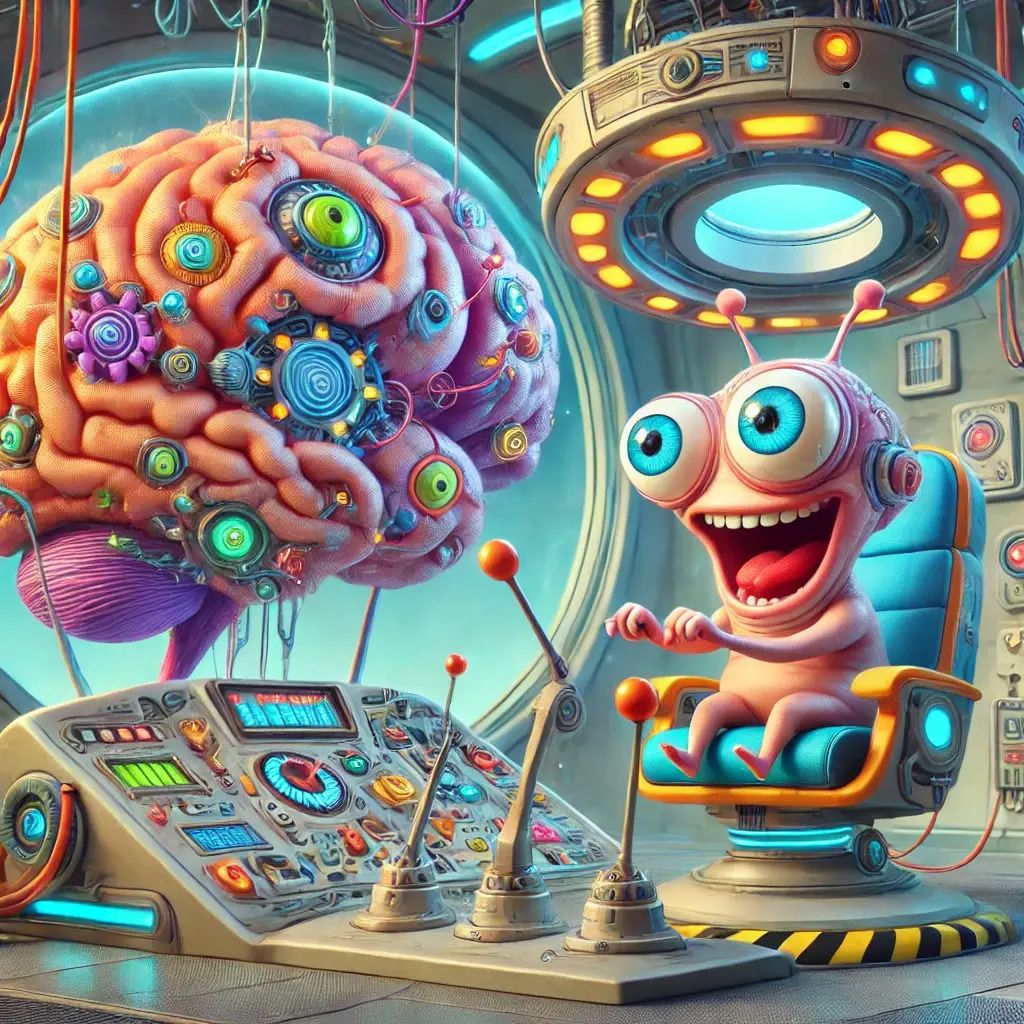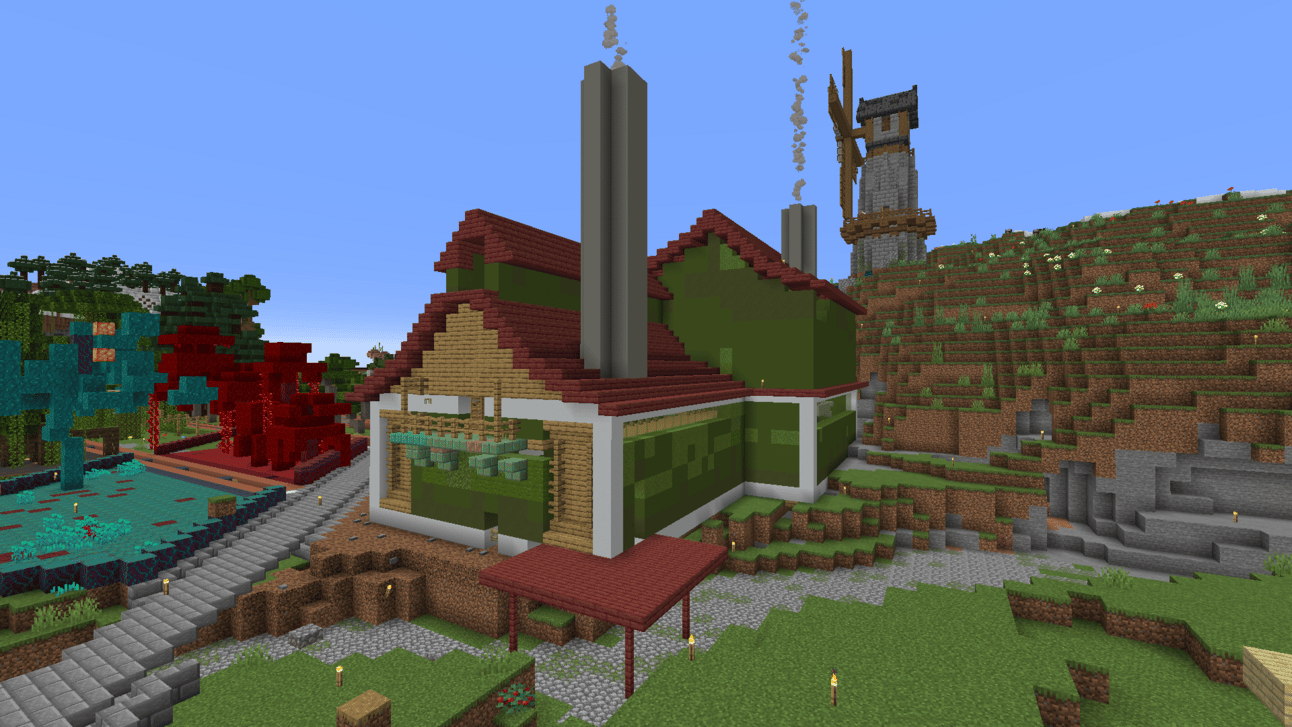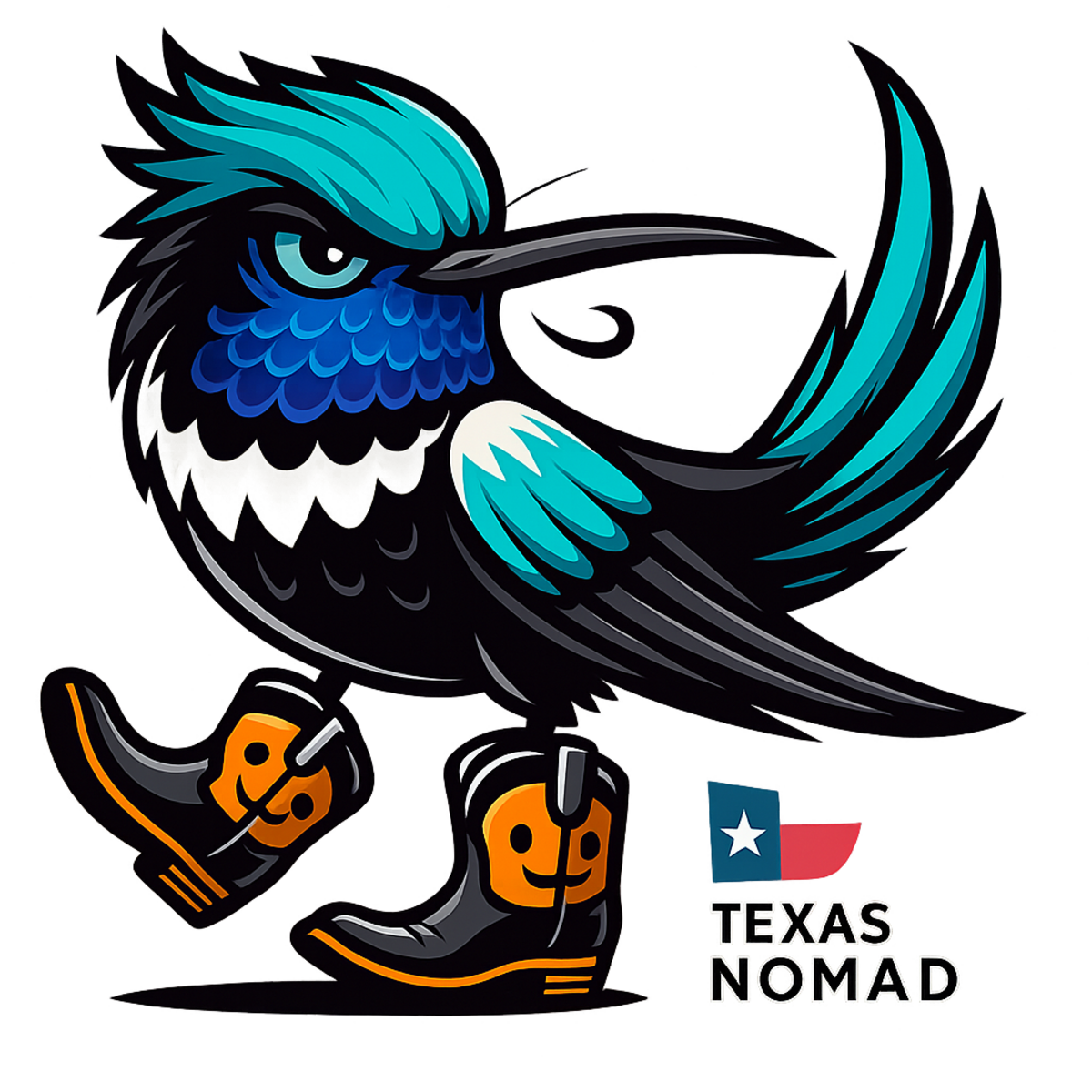I may not have gone where I intended to go, but I think I have ended up where I needed to be.

ATN - The Big Ole A.I. Travel Guide
Stop scrolling right now. ⛔️
You made it to Newsletter #2 of A Texas Nomad, and let me tell you—I couldn’t be more thrilled to have you here! 🎉
Launching this newsletter felt like leaping off a cliff with nothing but a laptop and a wild idea, but the response to our first edition? Amazing! Thank you so much.
💙 to all who brought comments — everything you add helps to build us stronger and better. Any comment at all—well, almost any. You know who you are👀.
This week, we’re diving deeper, laughing louder, and expanding horizons.
Whether you’re here to spark curiosity, ignite your creativity🎨, or simply escape for a few minutes, I promise you’ll leave this page inspired🌟.
Let’s reinvent the way we think, explore, and dream—together.
What You’ll Find in This Week’s Newsletter📖✨
1️⃣ 🤖 How AI Can Be Your Ultimate Travel Companion
Discover how artificial intelligence can help you plan, pack, and navigate your next adventure with ease.🧳📍
2️⃣ GEAR🦉: Duolingo
The new Duo is a powerhouse—time to mess around with it again!
3️⃣ STREAM📺: Severance
If you haven’t watched this mind-bending masterpiece yet, now is the time.
4️⃣ READ: James by Percival Everett
A literary gem blending humor, heart, and razor-sharp commentary.
5️⃣ RIP — David Lynch 🎥
Honoring the legacy of a true artist of the subconscious💭.

AI AI AI Oh!
Maybe the intelligence is artificial, but the arepas ain’t
AI isn’t just reshaping the way we travel; it’s reinventing how we dream, plan, and experience the world.
When I first began my adventure, the tools in my arsenal were the essentials: a well-worn backpack 🎒, a passport, and a palpable excitement.
Fast forward to today, and much-improved luggage, I’ve added artificial intelligence 🤖 as my digital co-pilot.
While the romance of a paper map 🗺️ and serendipitous encounters remains alive, AI has amplified how I navigate the world 🌎, enriching every leg of the journey.
Modern-day nomads, adventurers, and culture hunters can wield AI to transform their travel experience—and maybe even feel a little smarter while sipping coffee ☕ in a foreign café.
AI as Travel Agent 🤖 🧳
Remember when planning a trip meant hours of flipping through guidebooks 📚, hauling bricks from the likes of Rick Steves or Lonely Planet?
Where you thought you discovered something off the beaten path, only to go to your little ‘secret’ cafe and notice everyone looks like you, talks like you, has the same worn-out backpack as you.
Everyone flips through a guidebook that says something like Off the Beaten Path 🛤️, while still very well placed on the path which, not beaten, but trodded down into a rut.
Believe it or not, travel 2.0 has arrived 🚀 and A.I. can help us stay off the beaten path.
How it works:
AI-powered platforms like ChatGPT or Kayak’s AI tools analyze vast amounts of data to tailor itineraries, find hidden gems 💎, and recommend optimal routes.
Whether you’re seeking the cheapest flights or the most unique off-grid Airbnbs, AI can give you more than a canned “top 10 attractions” list.
• Flight Predictions: Apps like Hopper ✈️ predict when flights will be cheapest based on historical trends.📉
• Custom Itineraries: Tools like Roam Around and Trip Planner AI let you input preferences, spitball ideas, and generate day-by-day plans 🗓️ based on your interests.

Colombian “Chiva” Party Bus
• Lodging: AI finds accommodation that suits your budget and vibe 🛏️—whether it is the wonderfully creative and inspiring Selina group in Medellin and Cartagena, or a remote cabin in Iceland 🇮🇸(sorry, couldn’t find a link to one of those, but I bet these A.I. tools can!)
🧐 Why it matters: Instead of being overwhelmed by the onslaught of options, you’re handed a curated set, leaving you free to focus on the fun part: daydreaming.
Packing Smarter, Not Harder
Packing for long-term travel is a science. Enter AI tools like PackPoint, which generate packing lists tailored to your destination, trip length, and planned activities.
Example: Going to Bogotá during the rainy season? PackPoint knows you’ll need layers and a waterproof jacket 🧥, even if you forget.
Planning a Patagonia hike? It’ll nudge you to bring durable boots 🥾and thermal socks 🧦.
But, if you want old-fashioned Human Intelligence, I recommend coming to Medellin and hitting me up. Here, in The City of the Eternal Spring, my city, you don’t have to worry about the weather.
My layering days are over.
Pro tip: Use AI to track airline baggage restrictions or optimize space in your luggage.
Machine learning algorithms can even suggest compression bags or folding techniques based on your specific items. (Marie Kondo would approve. 🧹)
Every traveler loves a bit of wandering 🧭, but there’s no shame in having a lifeline 📡when things go sideways. AI-powered navigation tools are like having a friend who knows the city like a local.
• Offline Maps: Apps like Maps.me and Google Maps offer AI-enhanced offline navigation, making it easier to roam in places with spotty internet.
• Real-Time Updates: AI tools can reroute you around traffic 🚦jams, sudden closures 🚧, or even political protests 🪧 in real-time.
Bonus for introverts: Translation apps use AI to offer real-time conversations in over 100 languages.
Want to order dumplings 🥟 in Chengdu? Speak into your phone, and voilà—a smooth transaction (and fewer chances of accidentally ordering chicken feet).
Have that first Bumble date with a Brazilian and you don’t know a single word in Portuguese? What?? Do they speak Portuguese?!
Go get you some Google Translate stat.
Dining Like a Local 🍽️

Maracuya, anyone?
Food is the heartbeat of travel, and AI is the monitor ❤️. Gone are the days of falling into tourist traps just because they had good Yelp reviews. Yelp, what’s that!?
• Restaurant Recommendations: AI algorithms scour data to recommend eateries based on reviews, proximity, and even personal dietary preferences.
Want vegan tacos in Mexico City? 🌮 Sorted.
• Menu Decoding: Apps like Google Lens (it’s back!) let you snap a photo 📸 of a menu to instantly translate it and suggest top-rated dishes.
AI and Safety While Traveling 🛡️
As someone who’s trekked through bustling cities and remote villages, I know the value of vigilance. AI tools can help mitigate risks without making you feel paranoid.
• Predictive Analytics: Tools like Sitata monitor global events and send alerts about political unrest, natural disasters, or health concerns. It also let’s friends and family back home know you are safe. (You’re welcome, Mom!)
• Crime Mapping: Apps like GeoSure use AI to rate neighborhoods based on safety data, giving solo travelers an extra layer of confidence.
It’s not just about avoiding danger; it’s about stepping into unfamiliar spaces with eyes wide open.
Immersive Experiences Through AI 🏛️📲
What if you could walk through the Colosseum as it was in its prime, gladiators and all? AI makes this possible through augmented reality (AR) and virtual reality (VR).
• Museum Guides: AI-powered apps provide personalized tours 🤓 with rich, contextual information. No more squinting at plaques in dim lighting!
• Cultural Learning: Duolingo’s (See Review below!) AI-driven lessons help you learn a new language on the go, enhancing your connection with locals.
The future? Picture immersive historical re-creations or AI-generated art installations that bring culture to life in ways we can’t yet imagine.
AI for Sustainable Travel 🌱
We travelers often worry about our carbon footprint. AI offers solutions to make travel more eco-conscious.
• Carbon Calculators: Platforms like Skyscanner ✈️ use AI to show the most environmentally friendly flight options.
• Route Optimization: AI tools for trains and buses suggest greener travel routes 🚆, reducing emissions.
Travel isn’t just about seeing the world—it’s about preserving it for future wanderers.
The Dark Side of AI in Travel

Let’s address the 🐘 in the digital room: AI isn’t perfect.
• Bias in Algorithms: AI often reflects the biases of the data it’s trained on, meaning it might favor well-trodden tourist paths over hidden gems.
• Overreliance: The risk of overusing AI is losing the serendipity that makes travel magical. Sometimes, it’s the wrong turn that leads to the best meal of your life.
🔑 The key is balance. Use AI as a tool, not a crutch.
A Glimpse Into the Future of AI Travel 🛫💭
Imagine this: you’re in a Parisian café, sipping espresso ☕, when your AI travel assistant whispers into your earphones 🎧, “There’s an underground jazz club 🎶 three blocks away that fits your vibe.”
Other possibilities on the horizon:
• Hyper-personalized tours led by AI avatars of historical figures 🏛️.
Go bowling with Napoleon, or, imagine Benjamin Franklin taking you on a cheese steak tour through Philidelphia🧀🥪, answering all of your questions and being a bit dodgy about letting his hair down in Paris 😏.
• AI-driven travel communities connecting like-minded wanderers in real-time.
• Wearable devices that adapt to your travel needs, from translating 🗣️ to weather forecasting 🌦️.
🌟 The future isn’t just bright—it’s mind-bender-ing. 🤯✨
Final Thoughts: Humans and AI, Hand in Hand
In the end, AI isn’t the hero of the story—you are🦸♂️🦸♀️. But it’s a damn good sidekick.
So, pack your bags, charge your devices🔋, and let AI help you chart your next adventure. The world is waiting—and now, with AI, it feels a little closer than ever
🪄.
May the WiFi be with you.
Gear

Duolingo — Did this Owl Get Smarter? 🦉✨
Remember when Duolingo was just that persistent owl guilt-tripping you about missed lessons? 📅😅
Well, hold onto your language books, because it's evolved into something far more fascinating – and slightly unsettling.
The app's secret sauce isn't just in its game-like approach; it's in how eerily well it mirrors natural language acquisition.
Take the notorious Spanish "por vs. para" challenge 🇪🇸. Instead of force-feeding you grammar rules, Duolingo sneaks these patterns into your daily exercises until one day you're using them correctly without even thinking – just like a toddler 👶 who never cracked open a textbook.
But here's where it gets sci-fi interesting: the new AI features.
This AI-powered personalization creates conversations that feel remarkably human, adapting to what I've learned while seemingly learning about me in return. 😳
It's like having a polyglot friend who's also kind of a stalker 🕵️♂️.
The Bottom Line: Duolingo has transformed from a cute language app into an AI-powered language immersion experience. Sure, it might be another step toward the machine uprising 🤖, but hey – at least we'll be bilingual when it happens.

Go ahead, try me…
Stream

Apple TV+'s Severance is back for its second season (January 17, 2025), and it's still messing with our heads 🤯 in the best possible way.
If you thought your work-life balance was complicated, try having a chip in your brain 🧠💾 that creates two separate versions of yourself: one who only exists at work (the "Innie" 🖇️) and one who has no idea what happened during those 9-to-5 hours (the "Outie" 🏡).
What makes this show so addictively unsettling 😨😨😨 is how it constantly forces you to question:
Would I do it? 🤔
Would I let a corporation literally split my consciousness if the pay was good enough?
Would I want to know what my "other self" does all day?
It's like a thought experiment you can't stop playing with.🎭🌀
Season 2 kicks off right where that mind-bending cliffhanger left us, with the "Innies" getting a terrifying glimpse of their outside lives.
But here's the really creepy part: while we're watching these characters navigate their surgically severed existence, aren't WE already living through a different kind of severance?
Think about it – AI is already splitting our attention, our identities, our very sense of self. Between our digital personas 🤳 and our "real" selves, how many versions of us exist now?
The show's genius lies in how it takes our modern anxieties about technology and corporate control 🏢 and, in some parallel universe, dials them up to eleven.
Watching Severance feels less like science fiction and more like a warning label for where we're headed.
The only difference? In the show, at least you know when you're being severed.🪚😨
The Bottom Line: Severance Season 2 isn't just must-watch TV 📺 – it's a mirror reflecting our own fragmented reality back at us. Just maybe don't watch it right before your next performance review.
Or do. That would make Lynch proud.
Read

Percival Everett's "James" takes us back to the muddy banks of the Mississippi, but this time we're seeing that familiar world through entirely new eyes.
The novel revisits the universe of "Adventures of Huckleberry Finn" but, instead of floating down the river with Huck and Tom's mischief, we're experiencing it through Jim's perspective – and what a perspective it is.
The brilliance of this book lies in how Everett manages to both honor and challenge Twain's original work.
His command of voice is nothing short of extraordinary – the way he channels Twain's style when needed while simultaneously crafting something entirely his own is a masterclass in literary ventriloquism.
In an age where AI can mimic any writer's voice with increasing accuracy, "James" reminds us just how far artificial intelligence has to go. The nuanced understanding of language, the layered historical resonance, the profound humanity that Everett brings to every page – these are elements that no algorithm has yet managed to replicate.
This is a book that's simultaneously harsh and lovely, managing to be both a gripping adventure and a poignant commentary on America's past and present.
Everett navigates through difficult waters with remarkable grace, crafting a narrative that's as entertaining as it is thought-provoking.
I read this in a hammock (as you should too – there's something perfect about swaying while reading about river journeys), and found myself completely transported. The familiar characters of Tom and Huck are there, but seeing them through Jim's eyes transforms everything we thought we knew about that world.
The Bottom Line: "James" is more than just a companion piece to a classic – it's a masterwork that stands proudly on its own.
It manages to be both a love letter to and a critical examination of one of America's most famous novels, all while telling a story that feels urgently relevant to our present moment.
Do yourself a favor: find a hammock, clear your schedule, and let Everett take you on this remarkable journey.

David Lynch
There's something magical about how David Lynch's mind worked.
His films don't just tell stories – they create entire universes where industrial sounds become music, where curtains whisper secrets🕯️, and where a log 🪵 might know more than you do.
From the haunting soundscapes of "Eraserhead" 🎥 to the neon-noir twists of "Mulholland Drive," 🌃🔦 Lynch has shown us that reality is just one option among many.
But here's the thing that really gets me: the source of his boundless creativity isn't some tortured artist routine – it's meditation 🧘♂️✨.
Twenty minutes, twice a day, every day since 1973. When I first learned this, I thought, "Wait, that's the secret sauce to accessing even a fraction of that Lynchian imagination?" 🤯 Sign me up.
So I started meditating.
No, I haven't written anything as wonderfully weird as "Twin Peaks" 🌲🦉(though I did recreate the Great Northern Hotel's sawmill in Minecraft 🎮, complete with that hypnotic loop of logs falling into the water🌊🔁).

Follow Me on TWITCH: MCSquared888
But what I did find was a different kind of creativity, a clearer mind, and weirdly enough, better dreams.
Lynch shows us that the strangest, most beautiful ideas 💡don't come from chasing chaos – they come from finding stillness. 🕊️
And while not all of us will direct surrealist masterpieces, we can all take twenty minutes out of our day to sit quietly and see what bubbles up from our own "ocean of consciousness," as Lynch calls it.
So here's my suggestion: in honor of Lynch, skip the moment of silence and try twenty minutes of meditation instead. It's easier than you think, and who knows? Maybe you'll start seeing backward-talking dwarfs in your dreams too. 🪵🦉✨
Just remember: the owls are not what they seem, but the benefits of meditation definitely are.
Call to Adventure
Advertisers and copywriters use a term called a CTA — a Call To Action. You know, at the end of the advertisement, when they tell you 🛒 BUY THIS!!
Here at A Texas Nomad, we have a different type of CTA — a Call To Adventure. 🌍✨
Why is travel important? Because it challenges us 💪. It stretches our minds, forces us out of our comfort zones, and gives us stories worth telling. In a world that often feels increasingly divided, travel reminds us of our shared humanity.
But I’ll add this—travel isn’t just about discovering the world; it’s about discovering yourself.
Whether you’re wandering through the cobblestone streets of Sabaneta 🇨🇴 or sipping espresso in a Parisian café ☕🇫🇷, each journey becomes a step toward a fuller, more connected version of you. 🛤️💖
The importance of travel isn’t just about what you see; it’s about how it changes the way you see 👀. And that, my fellow nomads, is the real adventure.
There you have it, your issue #2 in the can. 📝✨

